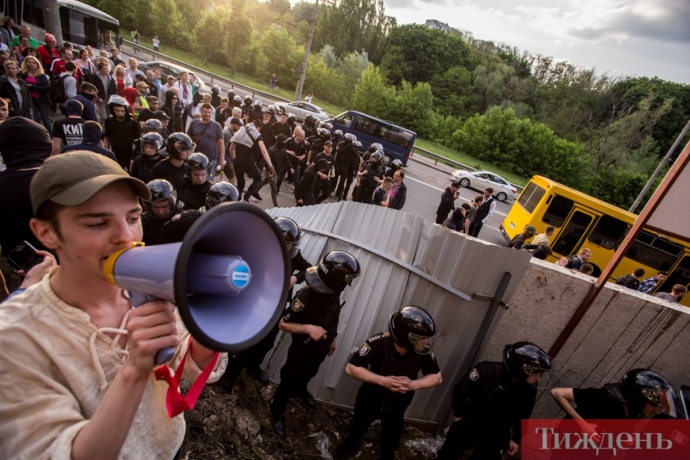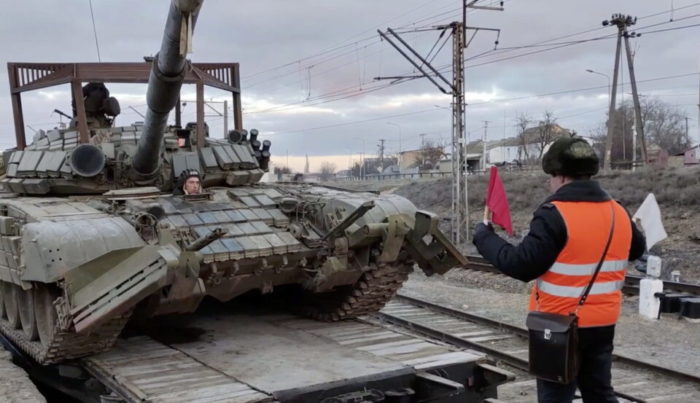Corruption, like rust, eats away at democratic societies. This is why activists in Ukraine have done so much to battle it. But in authoritarian societies like Russia, the more corruption, the harder it is to wage wars. Putin's Russia needs more corruption, and we should actively encourage it, says political scientist Anton Shekhovtsov.
In early June of this year, Russian invaders killed Roman Ratushnyi, a 24-year-old Ukrainian civic activist who volunteered to defend his motherland from Putin's genocidal attack.
He was 16 when he took part in the Euromaidan protests that led to the 2014 Maidan Revolution. After the Revolution, Ratushnyi became involved in various social initiatives and became one of Ukraine's most well-known anti-corruption activists.

Like many, he recognized that, no matter how democratic Ukraine became following the Revolution and the fall of the pro-Russian leadership, corruption prevented the country from reaching its full potential or at the very least, hampered that process. He may also have realized that corruption was one of the reasons that neither the Ukrainian army nor the country's security services were able to provide meaningful armed resistance to Russia's occupation and annexation of Crimea in February-March 2014.
Corruption is like rust, and this metaphor goes beyond rust's proclivity to spread. Like rust, corruption erodes whatever surface it comes into contact with. It degrades that surface, and if the surface is part of an object's function, corruption undermines that function.
Under the pro-Russian leadership, corruption had degraded the Ukrainian army to such an extent that it could not serve as the country's shield in times of need. Rust had eaten away at the shield's surface.
Ratushnyi and many other Ukrainian anti-corruption activists understood that the defense of democracy required sturdy and durable armor – a strong and potent army, efficient security services, powerful intelligence, and counterintelligence.
The Kremlin is perfectly aware of this. Russian agents of influence in Ukraine have done everything in their power to obstruct and slow down anti-corruption reforms. At the very same time, Putin and his cronies have frequently used the narrative of an allegedly corrupt Ukraine to discredit the country in the eyes of the West.
In the case of Ukraine, we are talking about corruption posing a threat to democracy. But what about corruption in authoritarian regimes and, especially, aggressive authoritarian regimes?
Corruption should be welcomed in authoritarian regimes
Unfortunately, many international institutions and anti-corruption watchdogs have misinterpreted corruption for a long time.
For example, the World Bank defines corruption as "the abuse of public office for private gain." According to Transparency International, corruption is "the abuse of entrusted power for private gain," adding that corruption "weakens democracy." As they refer to "public office" or "entrusted power," both definitions imply – if it were not for the good nature of those in power – then at the very least, it's their obligation to act in the country's best interests and the people they govern.
In this context, corruption is viewed as intrinsically bad because it undermines the authority's ability to do good.
However, as previously stated, corruption, like rust, erodes any surface it comes into contact with, whether good or bad. It is natural to condemn corruption when it corrodes democracy's shields, but what about swords of authoritarianism or totalitarianism? What if we're dealing with criminal authorities who persecute societies, communities, or minorities? What if we're talking about genocidal regimes?
In these cases, corruption degrades the efficiency of these regimes in their repressive and genocidal practices; corruption blunts the swords of authoritarian and totalitarian domination. We should welcome it.
This rethinking of corruption is especially pressing today in light of Russia's ongoing genocidal invasion of Ukraine
What do we think of Russian officers trading information on Russian troop deployment for money? Or how about Russian soldiers dismantling military equipment in need of repair and exchanging parts for vodka? Or of senior Russian officers selling their soldiers' provisions, thereby significantly impeding their advance? These are all true stories of corruption in the Russian army, and we need more of them.
Corruption is crucial in undermining Russia's war effort
Let me give an example. Almost all Russian malign influence operations involve a hierarchy of people, starting from those who commission and provide funding for a particular operation. Then there are contact people whose job is to find contractors for the operation, and then there are foot soldiers who carry out an assignment. And, at every stage of moving financial resources from the commissioner to front-line workers, they are being misappropriated, resulting in workers being paid too little to work well.
Some observers, including those in Ukraine, believe that Russian corruption was one of the main reasons Russia launched the war against Ukraine. This is a misconception.
Corruption exists all over the world, and in some places, it is even worse than in Russia, but why was it Putin's Russia that started a genocidal invasion of its neighbor? Or was it because of corruption in the Soviet Union that Stalin started the Holodomor, the genocidal famine in Ukraine that killed millions at the beginning of the 1930s? No, it was never about corruption; it was always about the nature of the regime.
I, myself, misinterpreted in the past Putin's regime as corrupt. However, identifying it as such implies that Putin is abusing the power entrusted to him.
He, however, is not.
Strategic corruption: the new hybrid weapon against the West
We need more corruption in Putin's Rusia
The destruction of democracy, the severe poverty of the population, the intellectual and moral degeneration of the so-called elites, the vicious inhumanity of the repressive apparatus – these are not defects of Putin's Russia; they are the very essence of it. And the power that Putin has was never entrusted to him; he seized it through terror, lies, and fraud. His regime is illegitimate; it is effectively a terrorist organization that hides behind the language of political and state institutions to veil its criminal nature. When the Putin regime murders, tortures, and steals, it is not abusing power; rather, it is exercising it.
The misconception of the essence of the Putin regime led some people to believe that it was important to fight corruption in Putin's Russia. The idea was that fighting and disclosing corruption would somehow make the Putin regime more democratic and socially responsible.
This is a grave mistake. Putin's Russia is irredeemable, and as long as the terrorists control the Russian state, it cannot be made more humane and socially responsible; it is simply not in its nature. But, more importantly, if corruption is like rust, then fighting corruption in Russia is like trying to remove rust from the sword to make it sharper and deadlier, or it is like conducting an audit to make the regime more efficient.
This is clearly the last thing we need. On the contrary, we need more, not less, corruption in Putin's Russia to undermine its function as a killing machine.
[bctt tweet="We need more, not less, corruption in Putin’s Russia to undermine its function of a killing machine." username="Euromaidanpress"]
Where we should fight Russian corruption – and fight resolutely and aggressively – is outside of the country where the Putin regime uses it as part of its political warfare against the West.
And all those Russian anti-corruption activists who want change in their country should radically readjust their agenda. We should not support their fight against corruption that blunts the sword of the genocidal Kremlin power. The West should not repeat the mistake of the 1990s when many thought that the embrace of capitalism by the post-Soviet Russian elites would lead them to build a democracy.
Democracy should come first; everything else comes second. But we should definitely welcome any contribution to the fight against Russian corruption in the West and elsewhere where it seeks to erode the shield of the liberal order. This we should never tolerate.
Related:
- How the West enabled genocide in Mariupol with its misguided Azov obsession
- Moscow’s genocidal war against Ukraine and new strategy of information warfare
- Will Ukraine win the war against Russia? Military components, key factors and their impact explained
- Moscow turns to regions to replace losses and boost forces in Ukraine
- What everyday corruption looks like in Ukraine
- Behind the scenes of civic society’s battle with corruption in Ukraine
- Strategic corruption: the new hybrid weapon against the West

